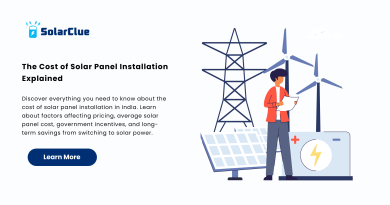On-Grid Solar vs Off-Grid Solar: Which To Choose?
Are you confused with On-Grid Solar vs Off-Grid Solar: Which To Choose? It is understandable that choosing an appropriate solar power system can be overwhelming. Renewable energy sources has become very popular So solar power has emerged as one of the most sustainable and practical options for both residential and commercial properties. Among the various types of solar power systems available, on-grid, off-grid, and hybrid systems are the most common. Each type of system has its own set of advantages and disadvantages, depending on the specific needs and circumstances of the user. In this article, we will explore the key differences between on-grid, off-grid, and hybrid solar power systems.
Table of Contents
On-Grid Solar Power Systems
On-grid solar power systems, also known as grid-tied systems, are connected to the local utility grid. These systems generate electricity from the sun using solar panels. And any excess power produced is fed back into the grid for credit or compensation. On-grid systems do not require batteries for energy storage, as the grid serves as a virtual storage system. This means that users can draw electricity from the grid when their solar panels are not generating enough power. This can be helpful during nighttime or on cloudy days.
One of the main advantages of on-grid solar power systems is that they are cost-effective and relatively easy to install. Since they do not require batteries, on-grid systems are typically less expensive than off-grid or hybrid systems. Additionally, users can take advantage of net metering programs offered by many utilities. They allow them to receive credits for excess energy produced by their solar panels. On-grid systems are also low-maintenance, as they rely on the grid for backup power.
Off-Grid Solar Power Systems
Off-grid solar power systems, as the name suggests, are not connected to the local utility grid. These systems rely on batteries to store excess energy generated by solar panels, which can be used during periods when solar power production is low. Off-grid systems are commonly used in remote areas where connecting to the grid is not feasible or cost-effective.
One of the main advantages of off-grid solar power systems is their ability to provide power independently of the grid. This makes off-grid systems ideal for properties located in remote areas or for emergency backup power in case of grid outages. However, one of the main drawbacks of off-grid systems is the need for battery storage, which can be expensive and require regular maintenance. Additionally, off-grid systems may require a larger initial investment compared to on-grid systems.
Hybrid Solar Power Systems
Hybrid solar power systems combine the benefits of both on-grid and off-grid systems. These systems are connected to the local utility grid, but also have a battery backup for energy storage. This allows users to take advantage of both grid power and solar power, while also having the security of battery storage in case of grid outages or periods of low solar power production.
One of the main advantages of hybrid solar power systems is their ability to provide reliable power in all conditions. Users can draw electricity from the grid when needed, while also storing excess energy for use during periods of high power consumption or low solar power production. Hybrid systems are also more versatile than on-grid or off-grid systems, as they can be customized to suit the specific needs of the user.
Conclusion
There has always been a lot of debate around On-Grid Solar vs Off-Grid Solar: Which To Choose? When considering a solar power system for your property, it is important to understand the differences between on-grid, off-grid, and hybrid systems. On-grid systems are cost-effective and easy to install, but rely on the grid for backup power. Off-grid systems provide independence from the grid, but require battery storage and may have higher upfront costs. Hybrid systems combine the best of both worlds, offering the reliability of grid power with the security of battery storage. Ultimately, the choice of solar power system will depend on individual needs, budget, and location. By understanding the differences between these systems, users can make an informed decision that meets their energy needs while maximizing the benefits of solar power.

